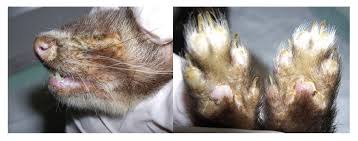Vaccine for ferrets

VACCINATION FOR FERRETS
Recommended vaccination program for ferrets:
- 8-10th week: Combined vaccination
- 10-12th week: Repetition of combined
- 14-16th week: Anti-rabies
- 6th month: Repetition of combined (Distemper, Leptospirosis)
- 1st: Anti-rabies+ combined (annual repetition)
DISTEMPER

Introduction:
In ferrets, this viral disease which is caused by Paramyxovirus is very dangerous, it even may be fatal and can also cause permanent damages. The causative agent spreads quickly via infected secretions, especially nasal secretion.
Symptoms:
The incubation time in ferrets is very short, serious symptoms may evolve after a few hours of infection. High fever is typical, subfebrillity, then lack of appetite, droop, catarrhic flow of the eye and nose. In case of bacterial ear infection purulent nasal flow and rarely diarrhea and vomiting occurs. Nervous systemic symptoms are typical, cramps of various muscle groups (tic) and even paralysis may evolve. In chronic cases, the nasal mirror and the foot pillows are dry cracked. In pregnant animals miscarriage may occur. In case of foetal infection, the toothgerm may be damaged, causing enamel-errors in the adulthood. The centric cerebrum inflammation may cause permanent epileptic symptoms later. In ferrets, the runoff of the disease is faster. The symptoms may develop in a few hours, the nervous systemic symtoms are more dominant and the fall is more common.
Prevention, treatment:
By giving a combined vaccination for the puppies older than 2 months, in a two weeks period twice, a basic protection can be formed, which can be maintained with repeated vaccinations. In case of disease, we can only apply symptomatic treatment, but fall is very common.
LEPTOSPIROSIS

Introduction:
Various kinds of leptospira bacteria are not rare in the environment, mostly in water polluted with infectious urine; but luckily, nowadays leptospirosis manifesting in symptoms rarely evolves in dogs, thanks to the combined vaccinations.
Symptoms:
After a few weeks of period of incubation high fever, dejection, lack of appetite, then jaundice, sometimes cramps occur.
Prevention, treatment:
Although it is a bacterial infection, leptospira is present in combined vaccinations, so we can defend against the disease. Treatment with antibiotics, started in the right time, the treatment of the disease may be successful.
RABIES

Introduction:
Rabies is an incurable, viral disease which is also dangerous for human. Carnivore animals have a significant role in its interposal. The causative agent spreads via saliva, usually by bite. By having the dogs and the bait of the foxes vaccinated, rabies is rare nowadays, but every time someone is bitten by a meat-eating animal, it should be thought about; the physician and the official veterinarian should be informed. In such a case, the rabies-suspicious animal should be monitored for 2 weeks, the bitten human should get anti-rabies vaccination series.
Symptoms:
After the bite, the virus –going along the nerves- gets to the systematic nervous system, causing severe symptoms of the nervous system. Consciousness-disorder, behavior-disorder, cramps, aggressive behavior, attacking ability, salivaton due to swallowing heaviness, foaming mouth then paralysis, drowning. There is also a silent form of rabies, when instead of the aggressive symptoms weird kindness of the wild animal may appear. For example, the rabid fox ventures to the human, or attacks the approaching human or animal from a hiding position.
Diagnosis:
Certain diagnosis can be set up from immune-fluorescenic examination of the brain tissue of the fallen animal.
Prevention:
Although it is not obligatory by the law, but it is recommended to vaccinate ferrets that meet other animals. In case of travelling abroad with carnivore (meat-eating) animals (dogs, cats, ferrets), the anti-rabies vaccination is obligatory.
